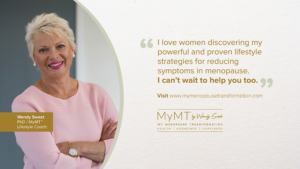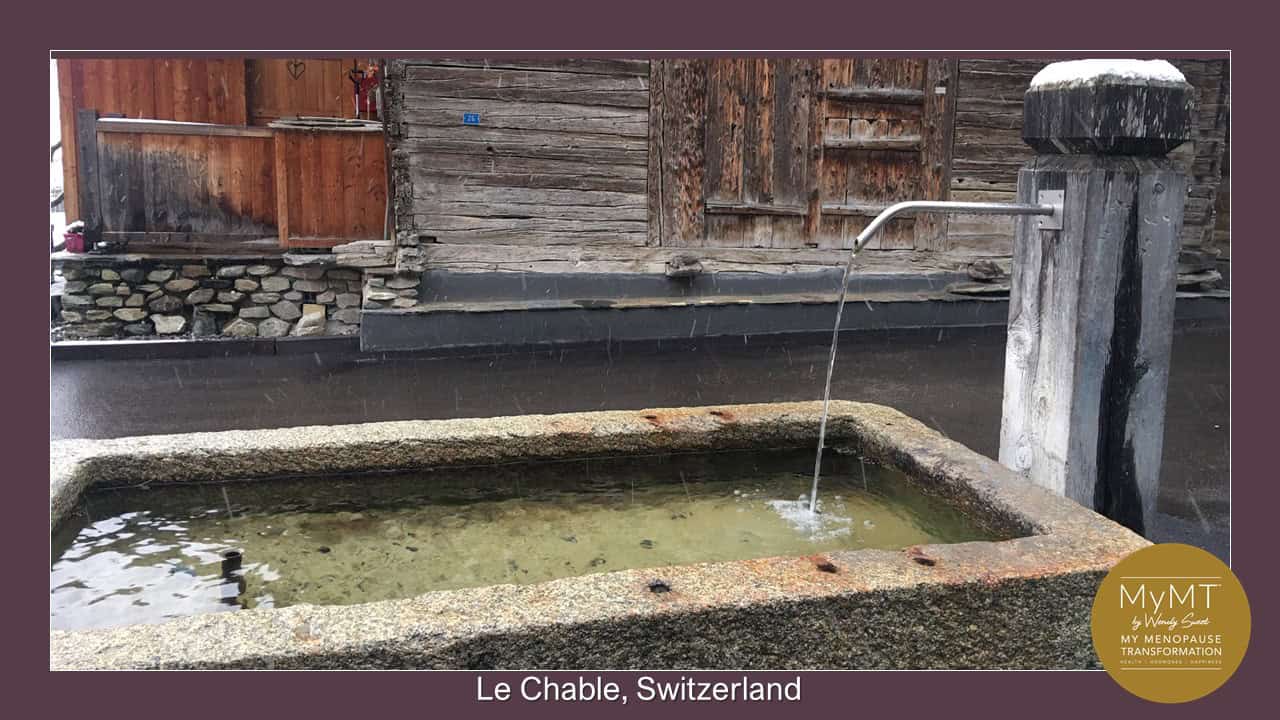When you walk through the small alpine village of Le Chable in Switzerland, you pass a number of ancient water troughs. Today, whilst out walking in this beautiful village, I filled up my water bottle from this water trough in the photo – yes the water is safe to drink and some of the best quality water in Switzerland is sourced from this valley where I’m staying for a couple of weeks. After meeting wonderful mid-life women in the UK at my live events last week, I’ve come over to Switzerland as my son is on the New Zealand ski team before heading back to the UK to meet more women in Liverpool, Sheffield and Birmingham. If you live near these locations then please join me if you can.
The small mountain village of Le Chable in Switzerland, is home to a source of glacial water that runs down off the towering mountains above and into the troughs in the village. At first I thought that these were for animals, but they aren’t. The locals drink this water and according to the World Health Organisation, this village has pristine water that is ranked high in it’s calcium and magnesium content. Yes indeed, 1 litre of this water delivers around 520mg of calcium per litre. That’s half of our total calcium intake of 1200mg per day. Drink 2 litres, as I did today and there is your calcium, done and dusted without a calcium supplement in sight.
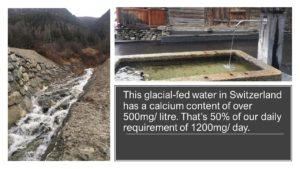
And to me, that’s good news. Because new research from the American Heart Association, shows that calcium supplements can be problematic for women in post-menopause. If all of our calcium is taken in supplements, then the body doesn’t absorb this type of calcium very well and this may lead to increased kidney stones and calcium plaques on our arteries.
For a generation of women convinced that we need lots of various supplements as we age, especially calcium supplements for improved bone health, then this is important information that we need to have – because if we need to be cautious about calcium in supplements, then we need to now how to source our 1200mg of calcium a day from food and water sources instead.
I never thought about my need for minerals when I went into peri-menopause. But with my head buried in my PhD and women’s healthy ageing research, I began to understand that one of the most important changes that occur as we lose oestrogen, is the increased constriction of our blood vessels (called vascular stiffness) and the numerous changes to our muscles and nerves too. All of these structures are affected by the loss of oestrogen and as such, we need to understand the nutrients, including vitamins and minerals, that help these organs to function better as we age.
My readings for my research took me on an incredible journey to better understand the role of specific minerals that help our nerves, blood vessels and heart to function as we move through menopause. When I studied the effect of low oestrogen on our physiology, metabolism and various organs such as nerves and muscles, this partly revealed why so many women end up with sore muscles, restless legs, cardiac palpitations and increased anxiety in menopause. Getting certain minerals into us as we age is important – and calcium and magnesium are just two of these that we need to manage our intake of every day because our body doesn’t make them. We need them from our diet and our water. It’s why the MyMT™ Food Guide which is part of the 12 week programmes, is full of lists of foods that give us the vitamins and minerals that matter to our health as we age.
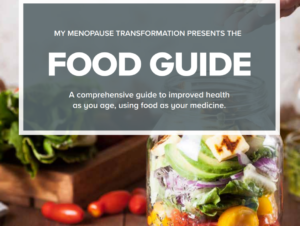
Positioning our menopause transition in women’s healthy ageing research has been fundamental to my improved understanding about what is going on with our biology at this time of our life … and what we can do to turn around all of our symptoms naturally. With respect to our changing blood vessels, muscle soreness and cardiac health as we go through menopause too. We need the essential minerals that matter. Which brings me back to our water quality and intake.
The minerals that matter include calcium, magnesium, potassium, phosphorous, sodium and chloride.
All these minerals are necessary for optimal heart, blood vessel and nerve function in a body that is losing oestrogen. Yes, you get these minerals through food and yes, through supplements (altho Positioning our menopause transition in women’s healthy ageing research has been fundamental to my improved understanding about what is going on with our biology at this time of our life … and what we can do to turn around all of our symptoms naturally. With respect to our changing blood vessels, muscle soreness and cardiac health as we go through menopause too. We need the essential minerals that matter. Which brings me back to our water quality and intake.
The minerals that matter include calcium, magnesium, potassium, phosphorous, sodium and chloride.
All these minerals are necessary for optimal heart, blood vessel and nerve function in a body that is losing oestrogen. Yes, you get these minerals through food and yes, through supplements (although calcium now renders caution with supplementation), but we also source essential minerals through good quality mineral water. Preferably, ugh calcium now renders caution with supplementation), but we also source essential minerals through good quality mineral water. Preferably, water like the water in Le Chable, that is sourced from natural alpine environments where it runs over rocks and takes on the minerals from the rocks. These minerals help your nerves to function and therefore give you more energy as well. Adequate water intake is also important for your hot flushes too and for those of you in Australia and New Zealand, who are battling the heat and humidity of summer at the moment, your water and mineral intake matters more than you think during your menopause transition.

The type of water that you are drinking matters and it’s why, when women come on board with me, one small change I’ve been helping them to understand (apart from learning to sleep all night which is also crucial to reducing muscle soreness and improving other symptoms), is how to have a renewed focus on the quality and amount of their daily drinking water. Especially if they are doing a lot of exercise.
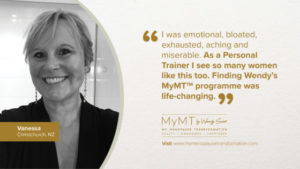
You see, when we go through menopause and we do lots of exercise, the muscles can become more inflamed, especially if we aren’t sleeping all night. If women aren’t sleeping, then their muscles aren’t recovering and if they haven’t got their calcium [and magnesium] intake sorted, then they develop sore, aching muscles, restless legs and increased palpitations and anxiety too – don’t forget, your heart is a muscle as well and it is affected by lowering oestrogen levels too.
For our muscles to recover and function every day, calcium intake matters.
I talk about this in my women’s healthy ageing online exercise programme called ‘Rebuild My Fitness’. In this fabulous 12 week programme [which is separate to my foundations programmes] I have a module called ‘Strong is the New Skinny’, and I explain to women on this programme, that we need calcium to help the nerve electrical signal ‘jump’ across into our muscles. This is how muscles contract. Calcium is the ‘carrier’ of the electrical signal from the nerve endings into the muscle fibres.
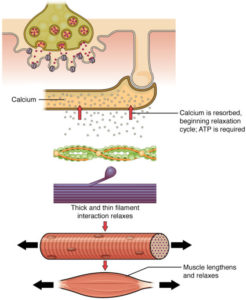
It makes sense that if we are regularly exercising, then we need calcium in our diet every day and not too much from milk and dairy products which are high in milk-sugars (lactose). If our sugar intake is high, then this can create problems with hot flushes, so getting calcium from other sources such as certain nuts, seeds, plants and good quality alpine mineral water.
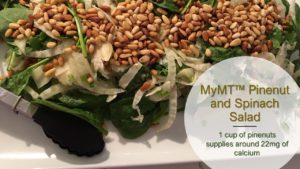
We need 1200mg a day of calcium, day after day … because our body doesn’t make it or store it for long either. That’s why I was drinking beautiful alpine-sourced water today. This type of water supplies adequate amounts of minerals that help our heart, muscles and nerves which are losing oestrogen as we age.
Over the past month, numerous women from around the world have joined me in the MyMT™ programmes. I’m so grateful that they have, because I want them to discover the powerful strategies that I’ve spent years researching to turn around our health, weight and symptoms in menopause and post-menopause naturally without the need for endless supplements and medications. One of the things I teach them is about getting back to basics with the type and timing of food and hydration, so that they reduce inflammation in their gut and liver and get the nutrients that their body needs as it transitions from producing oestrogen and progesterone to not producing oestrogen and progesterone. This is what the body is trying to achieve in menopause!
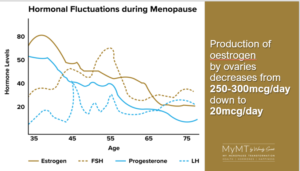
Drinking water that has fed from alpine regions and runs over rocks, means that the water is picking up all the minerals it can, hopefully without the additional pollution! These minerals are generally magnesium, calcium, phosphorus, potassium and other minor minerals. And yes, in our menopause transition, all these minerals matter to our symptoms and health as we move through this important life-stage.
When I’m back home, the only access I have to alpine/spring water, is in a box. So, today and every day whilst I’m in this beautiful part of the world for the next fortnight, it’s nice to get it straight from the source.
